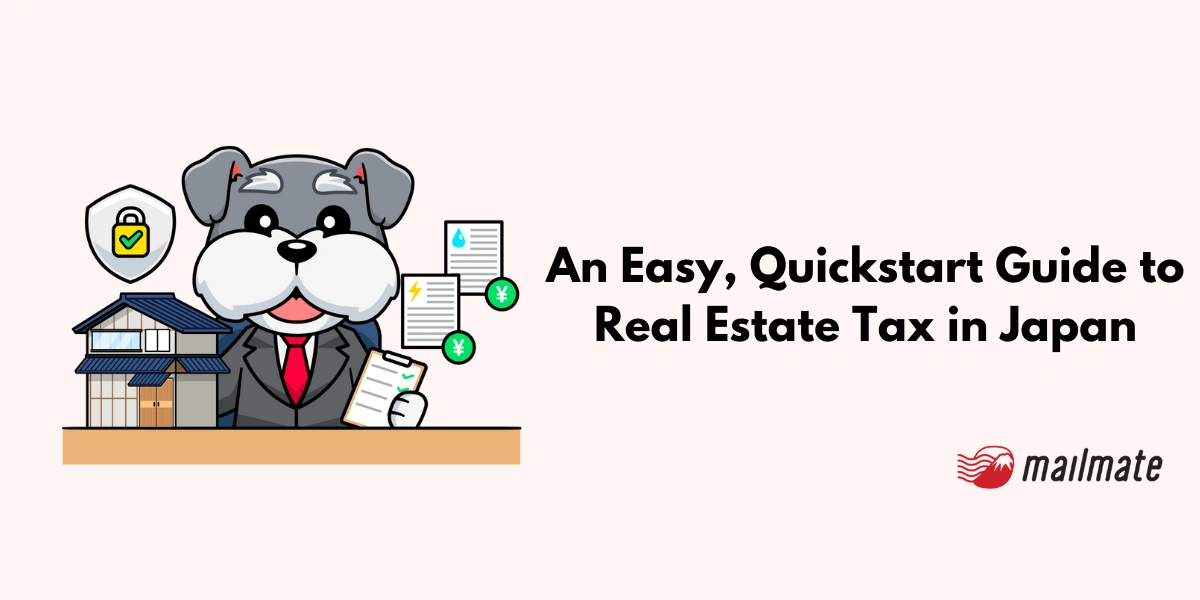Real Estate Tax in Japan: An Easy, Quickstart Guide

In general, there are 4 types of real estate tax in Japan that you might encounter for your real estate investment.
These are as follows:
Property Acquisition Tax / 不動産取得税 (one-time tax)
Fixed Assets Annual Tax / 固定資産税 (4 times a year)
City Planning Tax / 都市計画税 (4 times a year)
Inheritance Tax / 贈与税 (one-time tax)
This article will cover the various types of Japanese property taxes and what property owners ought to know Japan will levy property taxes.
Before we dive in, here's a bird's eye view of the 4 occasions when property taxes are levied.
At the time of acquiring the property
During the ownership of the property
When the property is sold
When the property is gifted or inherited
Let's look at each of these in turn:
1. Property acquisition tax (不動産取得税 / 登録免許税)

Property acquisition tax in Japan is a one-time tax levied when you purchase any property in Japan, including the purchase of land and buildings.
This Property Acquisition Tax consists of two parts: touroku menkyozei (登録免許税 =とうろくめんきょぜい) and fudosan shutokuzei (不動産取得税 = ふどうさんしゅとくぜい).
Subsequently, your tax bills are also paid in two parts:
Part 1. Touroku menkyozei, registration and license tax, is paid as a revenue stamp affixed to the property purchase contract.
Part 2. Fudosan shutokuzei is a tax bill sent to you by the Legal Bureau where your property is registered (aka registration tax).
How much does property acquisition tax cost?
The calculations for real estate acquisition tax are as follows:
[land assessed value result] x 0.04 +[building assessed value result] x 0.04
*Calculated with a standard tax rate of 4%
*However, tax reductions are applicable for residential real estate until March 31, 2027
Residential Land: (Land value) × 1/2 × 3%
Residential Building: (Building value) × 3%
How is property acquisition tax paid in Japan?
If you are working with a real estate agent, they will typically prepare the touroku menkyozei (registration and license tax stamp duty) and include the tax amount in your fees to the real estate company.
The fudosan shutokuzei tax bill is a physical bill from the Legal Bureau, which is sent to your newly registered property 6 to 12 months after the change in property ownership has been recorded.
Note: For property owners not living in Japan, MailMate provides a tax representative service, allowing you to take care of the acquisition tax without needing to be physically present at your property in Japan.
2. Taxes for owning property in Japan (固定資産税 / 都市計画税)

If you own property in Japan (land and buildings), you are subject to fixed asset tax and city planning tax (if your property is within designated urban areas).
In Japanese, fixed asset tax is called kotei shinsanzei (固定資産税 = こていしさんぜい). City planning tax is called toshi keikakuzei (都市計画税 = toshi keikakuzei).
How much does fixed asset tax and city planning tax cost in Japan?
Fixed asset tax is calculated at a standard tax rate of 1.4% of your land/building's assessed value. And city planning tax has a tax rate of 0.3% of assessed land/building value.
Land value is based on the land size, and building value is based on the date of construction.
👉 Check out MailMate's property tax calculator.
How do I pay fixed asset tax and city planning tax in Japan?
Your fixed asset tax bill is sent once a year to your property in Japan. Typically, this bill can be paid at a Japanese city office, post office, or convenience store.
Some regions have begun to digitize bill payment processes, but the current standard is paying via cash at a counter.
City planning tax only applies if your property is within a designated urban planning zone. If it is, the city planning tax bill will be sent along with your fixed asset tax to your property in Japan.
This bill is also generally paid at a local city office counter, post office counter, or convenience store.
For those outside of Japan, consider using MailMate as your tax representative so you can seamlessly pay your property tax bills from abroad.
3. Taxes when selling real estate (所得税/住民税)

As with any other income generated within Japan, you must report profits when selling real estate property (land or buildings).
The income you generate from selling your property will then be subject to income tax, shotokuzei (所得税 = しょとくぜい), and residence tax, jyuminzei (住民税 = じゅうみんぜい).
What is the tax rate on income from selling real estate in Japan?
The tax rate applied to selling real estate in Japan is calculated based on the years you have owned the property.
If you have owned the property for over 5 years as of January 1st of the year of the sale, long-term capital gains will be taxed at 15% income tax, 5% resident tax, and 0.315% special income tax for reconstruction.
If you have owned the property for less than five years, short-term capital gains will be taxed at higher rates than for long-term transfers, specifically at 30%, 9%, and 0.63%.
How do I pay taxes on my real estate sale in Japan?
Your real estate sale taxes should be filed in an income tax return that you submit before March 15 of the following calendar year.
For example, if you purchased a property in May 2024, you would file an income tax return before March 15, 2025, listing your sale.
4. Taxes when inheriting real estate in Japan (贈与税)

If you inherit a property in Japan, you will be subject to a one-time inheritance tax.
Inheritance tax in Japan is called zoyozei (贈与税 = ぞうよぜい).
How much is inheritance tax on real estate in Japan?
The cost of inheritance tax on real estate in Japan is calculated based on the assessed road value for land and the fixed asset tax assessment value for buildings.
Various deductions can be claimed to help mitigate the inheritance tax cost, so consult with an accountant who can make sure you are taking advantage of possible exemptions for inherited personal property.
Some deductions include the following:
A basic deduction of 1.1 million yen.
Donation of residential property to a spouse with a marriage period of 20 years or more carries a tax exemption of up to 20 million yen.
Inheritance tax settlement system: 6 million yen x legal heirs + 30 million yen.
Subtraction of negative assets.
How do I pay inheritance tax on my property in Japan?
Inheritance tax must be paid within 10 months after you learned of the deceased’s death.
Your inheritance tax return can be submitted to a Japanese tax office via e-Tax (electronic filing), by mail or express delivery, or by dropping them off in person to a tax office counter or in a tax office's after-hours collection box.
The National Tax Agency warns that if you do not file within the 10 months, you may be subject to additional taxes and late payment penalties in addition to the original tax.
The following methods are accepted forms of payment for inheritance tax:
1. Electronic tax payment
2. Credit card payment
3. Payment at a financial institution or tax office
For more information on real estate inheritance tax, please see the National Tax Agency guide and consult with your accountant.
Frequently asked questions
Are there real estate taxes in Japan?
Japan's real estate taxes include property acquisition tax, fixed asset tax, city planning tax, and inheritance when receiving a property. These property taxes are levied at specific times in your property journey, such as when purchasing a property, owning a property, selling a property, and inheriting a property.
What is the withholding tax on real estate in Japan?
Withholding tax on real estate in Japan applies differently to non-residents and foreign corporations, depending on whether they sell property or receive rental income.
When non-residents or foreign corporations sell real estate in Japan, the withholding tax rate is 10.21% of the transfer value. The buyer withholds this tax and must be paid to the tax office by the 10th day of the month following the transaction. However, there are exceptions:
No withholding tax is required if the purchase price is less than 100 million yen and the buyer uses the property for their residence or that of their relative.
If you own a rental property, then rental income is subject to a withholding tax rate of 20.42% of the rental income.
There are various exceptions to these guidelines, so consult with an accountant.
Does Japan have an estate tax?
Japan does not have an estate tax in the traditional sense. Instead, Japan imposes an inheritance tax (相続税, souzokuzei) on the beneficiaries who receive assets from a deceased person. In other words, the heirs are individually liable for taxes due on inherited assets rather than the estate itself. The inheritance tax in Japan is calculated based on fair market value of the inherited assets at the time of the benefactor's death.
In closing
If you are a real estate investor interested in Japan's real estate market or considering buying a second home in Japan, it's essential to understand Japan's property taxes to comply with the country's tax laws.
MailMate's fluently bilingual tax representative service helps property owners stay up to date on their real estate tax bills by liaising between clients and the local government.

The service includes the following features:
Tax representative for annual real estate tax payments
Domestic point of contact for authorities (required by law)
Bill pay support for property tax payments
Tax notifications with English summaries
A virtual mailbox to receive the mail that arrives at your Japanese property
Manage important property documents and notifications in one place
Other services MailMate offers include utility and Internet setup of your Japanese property!
Founded in 2019, MailMate has simplified property ownership for foreigners living abroad and is an increasingly popular option recommended by users and well-known industry figures.

Additionally, if you use MailMate's tax representative service for property owners, MailMate will take care of filing the tax representative form with the relevant tax office on your behalf.
Navigate Japan's tax system with an experienced tax representative service tailored for foreign property owners!
Spending too long figuring out your Japanese mail?
Virtual mail + translation services start at 3800 per month. 30-day money-back guarantee.

